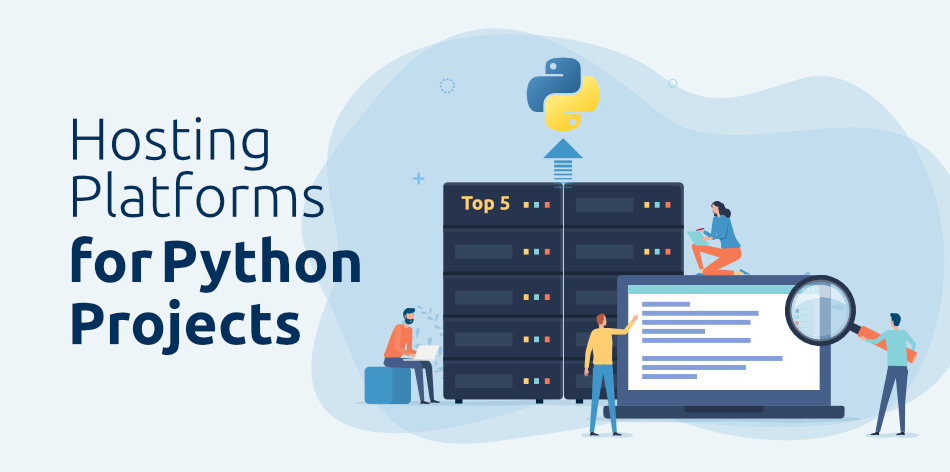Best Platforms to Host Python Apps
 SHAIK IRFAN
SHAIK IRFAN
Introduction
Hello, Web Enthusiasts!
Welcome to Irfan Blogs, your go-to destination for all things web development!
Today, we embark on an exciting journey into the realm of hosting Python web apps on servers.
Python has emerged as one of the most popular programming languages, and its versatility makes it a top choice for developing web applications, APIs, and other software solutions. When it comes to deploying and hosting Python apps, selecting the right platform is crucial for ensuring optimal performance, scalability, and ease of management. In this article, we'll explore some of the best platforms available for hosting Python applications, catering to various needs and preferences.
1. Render.com
Render is a cloud service to build and run apps and websites with free TLS certificates, a global CDN, auto deploys from git, and more.
It lets you run web apps, static sites, docker containers, cron jobs, background workers, and fully managed databases with backups.
Most services, including the one for running Python web apps, can be used with a free tier to get started. It’s a perfect platform to host weekend projects for free but also to scale them up if needed.
2. pythonanywhere.com
PythonAnywhere is a platform specifically designed for hosting Python applications. It simplifies the process by providing a fully managed environment with built-in web hosting capabilities. It's a great option for beginners or those looking for a quick and easy way to deploy and test Python applications without dealing with complex infrastructure configurations.
You get one web app with a pythonanywere.com domain for free, and upgraded plans with more power start at $5 per month.
3. Railway
Railway is a deployment platform where you can provision infrastructure, develop with that infrastructure locally, and then deploy to the cloud.
In addition to deploying from an existing GitHub repo, they provide multiple templates that get you started with different frameworks in no time.
The Starter tier can also be used for free without a credit card, and the Developer tier is still free under $5/month.
4. Heroku
Heroku is a cloud platform that simplifies the deployment process, allowing developers to focus on writing code rather than managing infrastructure. It supports various programming languages, including Python, and provides a seamless experience for deploying web applications. Heroku's ease of use, automatic scaling, and a wide range of add-ons make it an excellent choice for developers seeking a hassle-free deployment process.
Heroku is probably still the best-known cloud application platform today.
However, they recently removed their free tier, and Heroku Dynos now start at $7/month.
Furthermore, they experienced a devastating security breach this year and resisted telling the public about it until outsiders sounded the alarm.
On the plus side, it’s still a reliable infrastructure with an easy developer experience. So you can make your own choice if you want to continue using it.
5. AWS (Amazon Web Services):
AWS is a cloud computing giant offering a variety of services suitable for hosting Python applications. Services like AWS Elastic Beanstalk and AWS Lambda provide scalable and easy-to-manage solutions for different types of applications. With a vast range of resources and global data centers, AWS ensures high availability and performance. Developers can choose from various services based on their specific requirements and preferences.
6. Google Cloud Platform (GCP):
Google Cloud Platform provides a robust infrastructure for hosting Python applications. App Engine, Google's fully managed platform, allows developers to deploy and scale applications effortlessly. GCP's services like Compute Engine and Kubernetes Engine offer more control for those who prefer a customized setup. With Google's global network and advanced machine learning capabilities, GCP is a solid choice for hosting Python applications.
7. Replit
At its core, Replit is an online integrated development environment (IDE) for creating and sharing code.
If you upgrade to the Hacker plan for $7/month, you get 5 Always On Repls that can also be set to private. This essentially allows hosting your apps immediately after coding them on Replit.
Conclusion:
Choosing the right hosting platform for your Python applications depends on various factors such as project complexity, scalability requirements, and personal preferences. Whether you opt for the simplicity of Heroku, the extensive services of AWS, the global reach of GCP, the Microsoft ecosystem with Azure, the user-friendly experience of DigitalOcean, or the simplicity of PythonAnywhere, each platform has its strengths. Consider your project's specific needs and constraints to make an informed decision and ensure a smooth deployment and hosting experience for your Python applications.
That's a wrap. Thanks for reading.
Hope this article was helpful to you.
If you enjoyed reading this, then please like and share this article with others.
Have fun coding!
Subscribe to my newsletter
Read articles from SHAIK IRFAN directly inside your inbox. Subscribe to the newsletter, and don't miss out.
Written by

SHAIK IRFAN
SHAIK IRFAN
"Full Stack Web Developer | Bridging Front-End Elegance with Back-End Power | Crafting Dynamic and User-Centric Digital Solutions"